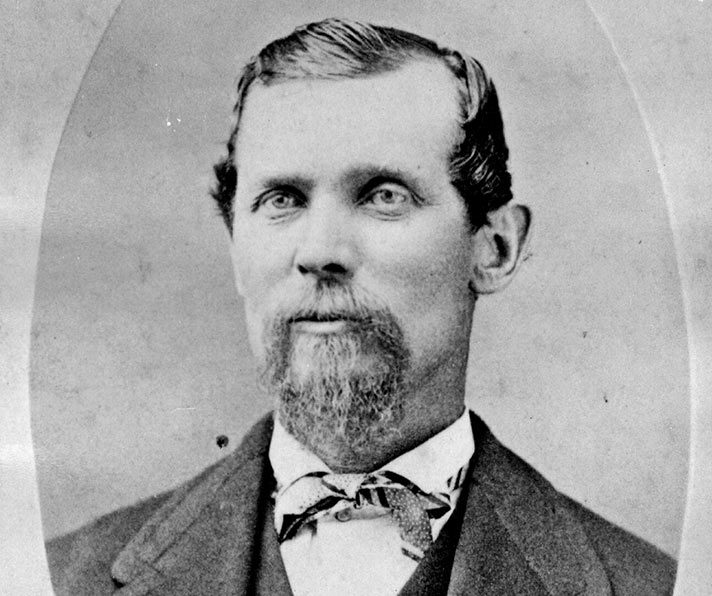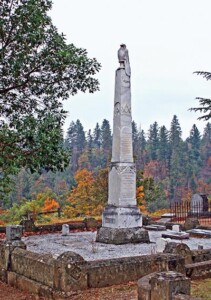Pioneer Profiles – August 2021
One of the more impressive monuments in Jacksonville’s Pioneer Cemetery—a towering obelisk engraved with Masonic ruler and compass, Odd Fellows linked circles, and a hand pointing upwards to indicate a heavenly reward—is that of John (Johannes) Bilger. Carved from imported Italian marble, the monument and surrounding masonry work shouts “success!” Indeed, the marker cost $1200, a princely sum when then 45-year-old Bilger died in 1877 from cholera, a victim of one of the many epidemics that Jacksonville residents succumbed to over the years. Today, a similar monument would cost over $30,000.
A native of Wurtemburg, Germany, John Bilger had immigrated to the U.S. in 1850. Like many other young men of his day, he had been influenced by two major events happening on opposite sides of the world. The first was the 1848 revolutions against European monarchs that began in Sicily and spread to France, Germany, Italy, and the Austrian Empire. They all ended in failure and repression, resulting in widespread disillusionment among the citizenries. The second, of course, was the discovery of gold in California that set off a rush of fortune seekers from around the world.
A 21-year-old Bilger had arrived in Jackson County by 1853. It’s possible that he took up a donation land claim, since at the time of his death he owned 700 acres of land in various parts of the county. It’s also possible that he tried his hand at gold mining. However, no later than 1856 he was in Jacksonville and in partnership with John Love in the tin business. That same year, Love and Bilger purchased a shop on California Street and within a year were actively engaged in selling “tin plate and sheet iron works to the public.”
Tin smithing would have been a lucrative occupation in early Jacksonville. Miners needed prospecting pans, buckets, eating utensils, and basic gear. Settlers needed everything from pots and pans to candleholders and chandeliers.
But as agriculture became as important as mining, Love and Bilger expanded their line of goods into hardware and farming implements. In 1866, the Oregon Sentinel reported that “Mr. Bilger has been to the Bay City this summer and laid in a stock of goods not only for the stove and tinware trade, but all kinds of hardware and farming implements. Plows, cultivators, hay cutters and many other things present themselves to view, as well as a large stock of iron chains from the smallest dog chain to the largest log chain.”
When Love died in 1867 from tuberculosis, Bilger continued the business under the Love and Bilger name. It had become quite the going concern, and by 1868, Bilger had an annual reported income of $1,000, making him one of the wealthier residents of Jacksonville. As the owner of one of the primary hardware stores in town, Bilger was also the source of materials and fittings for county projects going back to at least 1863, including bridges, the courthouse, jail, judges’ offices, the pest house, and more. His name appears as a payee in the County Commissioner’s records up until the time of his death.
Bilger also had mining interests, holding shares in both the Timber Gulch and Shively Gulch quartz claims. The mines reportedly were rich sources of gold, silver, copper, and cinnabar. By 1877, Bilger’s annual income was over $24,000, second in Jackson County only to that of R.B. Hargadine.
In 1861, Bilger had married Amanda Scheck, also a native of Germany. Born in 1840, a 20-year-old Amanda had crossed the Oregon Trail from Iowa with her twin sister, Anna, and her brother-in-law, William Kreitzer, arriving in Jackson County in 1860. We’re not sure how the couple met, but the local German community had brought many of their social organizations with them, along with their cultural traditions, which would have provided multiple opportunities for a successful man and an attractive young woman to meet.
Prior to his marriage, Bilger had resided with his partner John Love and Love’s family on North 3rd Street. However they jointly owned property on both North 3rd and Blackstone Alley. Around the time of his marriage to Amanda, Bilger had a wooden house constructed on the Blackstone Alley property, the couple’s first home. He then commissioned the substantial brick home we are familiar with for what soon became a growing family of eight children. Like others of the time, the new home was built quite literally “smack, dab” in front of the old, with the original wooden structure incorporated into the new. The Bilger house is one of the few brick homes built in Jacksonville and the only one in the Federalist style.
Love and Bilger later exchanged joint property ownership for clear titles with Love retaining the North 3rd Street property and Bilger the Blackstone Alley lot.
But Bilger was not just a successful businessman and family man. Having come from a Europe that denied him many basic rights, Bilger, like many other immigrants, embraced his new homeland, giving back to his adopted community and making the most of the opportunities available. He enlisted in the militia. He served as a juror. He participated in Fourth of July celebrations, both repairing and firing the town cannon.
Bilger had become a U.S. citizen in 1859, so in addition to being a government supplier, he was eligible for government posts. Love had been the “public face” of their partnership, serving as a town Trustee in the early 1860s and helping to lay out and adopt the town plat, but in 1863 Bilger was elected Jacksonville Street Commissioner.
Business demanded his full attention after Love’s death in 1867, but Bilger ran for and was elected Jackson County Treasurer from 1872 to 1874, a position in which he earned $150 every three months. In 1873, he was appointed the first postmaster of Brownsboro, an unincorporated community along Little Butte Creek about four miles east of Eagle Point.
As indicated by the symbols on his monument, Bilger was also active in both the Odd Fellows and Masonic fraternal orders. He joined the local Warren Lodge No. 10 of Ancient Free and Accepted Masons in 1856. He served a stint as lodge treasurer and was a member until the time of his death. In fact, the first meeting in the newly constructed Masonic Lodge at the corner of California and 3rd streets was John Bilger’s funeral.
Bilger was memorialized by both fraternal orders and the town as a 25-year resident “well known for his upright character”; “most worth and exemplary…whose heart was ever open, tender and sympathetic, and whose hand was ever ready to relieve the suffering of the afflicted and distressed wherever found”; “a kind loving husband and an affectionate father, and…a good neighbor and worthy citizen distinguished alike for honesty, industry and integrity.”
And for those of you wondering about Amanda…. With eight children to support, Amanda took over the running of the hardware store following her husband’s death, renaming it Pioneer Hardware. By the 1880s she had focused even more on agricultural equipment, going into partnership with Aaron Maegly. By 1884 “Bilger and Maegly…represent[ed] leading manufacturers of agricultural machinery and implements.” In 1885, Amanda sold her share of the business to Maegly. She subsequently moved to the Portland area where three of her children lived, investing heavily in Portland real estate. By 1910 she was living with a daughter in Los Angeles. Amanda died there in 1920.

